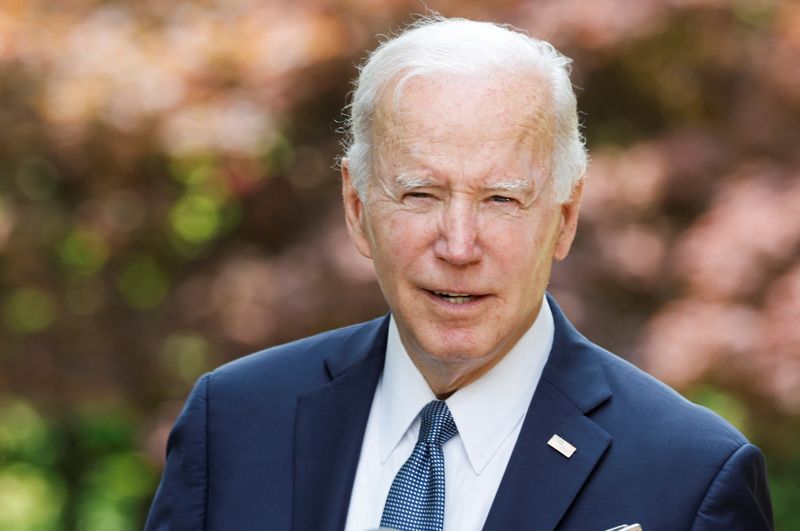In Japan, Biden to launch economic plan for region sceptical on benefits By Reuters

© Reuters. U.S. President Joe Biden delivers remarks with Hyundai Motor Group Chairman Euisun Chung (not pictured) on the automaker’s decision to build a new electric vehicle and battery manufacturing facility in Savannah, Georgia, as Biden ends his visit to Seoul
2/3
By Trevor Hunnicutt and Yoshifumi Takemoto
TOKYO (Reuters) -President Joe Biden arrived in Japan on Sunday to launch a plan for greater U.S. economic engagement with the Indo-Pacific, facing criticism even before the programme is announced that it will offer scant benefit to countries in the region.
On the second leg of his first Asia trip as president, Biden is to meet with leaders of Japan, India and Australia, the “Quad,” another cornerstone of his strategy to push back against China’s expanding influence.
In Tokyo on Monday, Biden will call on Emperor Naruhito before talks with Prime Minister Fumio Kishida. He and Kishida are expected to discuss Japan’s plans to expand its military capabilities and reach in response to China’s growing might.
Tokyo will also see the launch on Monday of Biden’s long-awaited Indo-Pacific Economic Framework for Prosperity (IPEF), a programme intended to bind regional countries more closely via common standards in areas including supply-chain resilience, clean energy, infrastructure and digital trade.
Washington has lacked an economic pillar to its Indo-Pacific engagement since former President Donald Trump quit a multinational trade agreement now known as the Comprehensive and Progressive Agreement for Trans-Pacific Partnership, leaving the field open to China to expand its influence.
But the IPEF is unlikely to include binding commitments, and Asian countries and trade experts have given a decidedly lukewarm response to a programme limited by Biden’s reluctance to risk American jobs by offering the increased market access the region craves.
The White House had wanted it the IPEF announcement to represent a formal start of negotiations with a core group of like-minded countries, but Japan wanted to ensure broader participation to include as many Southeast Asian countries as possible, trade and diplomatic sources said.
Given this, Monday’s ceremony will likely signal an agreement to start discussions on IPEF rather than actual negotiations, the sources said.
“Japan wanted as many participants as possible … and also wanted the U.S. to conduct an inclusive process of dialogue after the launch,” a person familiar with the discussions said.
This source said the launch was expected to be attended in person by Indian Prime Minister Narendra Modi, Biden and Kishida, and by other leaders virtually.
LACK OF INCENTIVES
A Japanese Finance Ministry official said many Southeast Asian countries would not join IPEF because of the lack of practical incentives like tariff reductions.
“It’s not a cold decision but a practical one, probably because it doesn’t really have significant contents,” the official said.
However, an Asian diplomat said a least half the 10 nations of the Association of Southeast Asian Nations (ASEAN) could join the launch ceremony.
“It seems the White House has decided to make the IPEF launch more like a party with an open bar that all are invited to, with the real work to start on Monday morning,” said Matthew Goodman, a trade expert at Washington’s Center for Strategic and International Studies.
“Eventually the administration is going to have to offer more tangible benefits if it wants to keep countries on board.”
U.S. National Security Advisor Jake Sullivan told reporters on Air Force One that Taiwan would not be a part of the launch of IPEF but that Washington is looking to deepen its economic relationship with the self-governing island region on high-tech issues, including on semiconductors and supply chains.
On Tuesday in Tokyo, Biden will join the second in-person meeting of the Quad group of countries. Hours ahead of his arrival, loudspeaker trucks and scores of protesters and proceeded through central Tokyo, denouncing the Quad talks and the war in Ukraine.
The four countries share concerns about China, but the Quad as a group has avoided an overtly anti-China agenda, largely due to Indian sensibilities.
India’s strong security ties with Russia and refusal to condemn its invasion of Ukraine will likely prevent any strong joint statement on that issue, analysts said.
At their last summit in March, Quad leaders agreed that what has happened to Ukraine should not be allowed to happen in the Indo-Pacific – a reference to the threat posed to Taiwan by China, though Beijing was not mentioned by name.
Chinese envoy for Korean affairs Liu Xiaoming said on Twitter (NYSE:) that Washington was “putting together a closed & exclusive ‘clique’.”
For all the latest Business News Click Here
For the latest news and updates, follow us on Google News.
